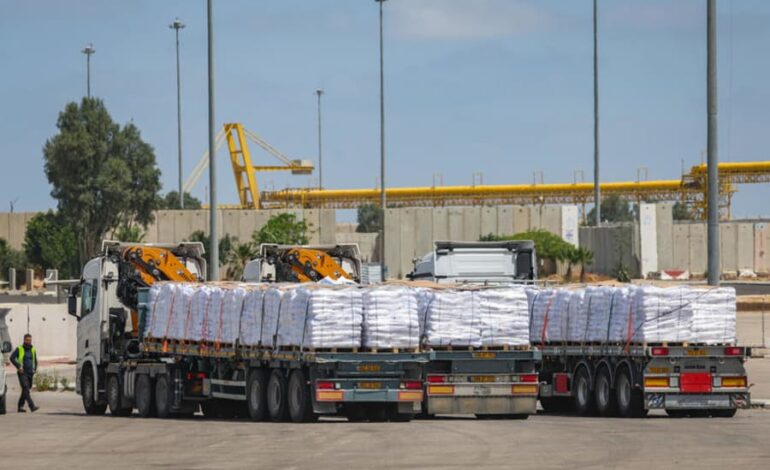
Faith Nyasuguta
On Monday, for the first time in nearly three months, a small convoy of humanitarian aid trucks entered Gaza, signaling a partial easing of Israel’s blockade. Five trucks carrying baby food and essential supplies crossed into the enclave via the Kerem Shalom crossing, according to Israel’s Coordination of Government Activities in the Territories (COGAT) .
This limited aid follows mounting international pressure on Israel to address the worsening humanitarian crisis in Gaza. Israeli Prime Minister Benjamin Netanyahu acknowledged that the decision was influenced by concerns from allies, including the United States, over the dire conditions faced by Gaza’s 2.3 million residents .
Despite this development, the United Nations and humanitarian organizations have criticized the scale of aid as grossly inadequate. UN Humanitarian Chief Tom Fletcher described the move as “a drop in the ocean,” emphasizing the urgent need for a massive, unhindered, and uninterrupted supply of assistance to reverse the trend of spreading hunger in Gaza .

During a previous ceasefire, approximately 600 aid trucks entered Gaza daily. In stark contrast, only five trucks were allowed in on Monday. While COGAT indicated that more trucks are expected to enter soon, the current pace falls significantly short of meeting the population’s needs .
The humanitarian situation in Gaza has reached critical levels. Food security experts warn that the entire population is at imminent risk of famine. The World Health Organization has highlighted severe shortages of food and medical supplies, with malnutrition rates, especially among children, rising rapidly .
International leaders have expressed strong opposition to Israel’s limited aid measures. UK Prime Minister Keir Starmer, French President Emmanuel Macron, and Canadian Prime Minister Mark Carney issued a joint statement condemning Israel’s actions as disproportionate and threatening sanctions if the offensive continues. They emphasized the intolerable level of human suffering in Gaza and called for immediate and substantial humanitarian assistance .

In response to the crisis, the United Nations has secured approval from Israel for approximately 100 additional emergency aid trucks to enter Gaza. These shipments include baby food and nutritional supplements urgently needed to save the lives of malnourished children. UN officials stress the critical importance of these supplies, warning that delays and continued shortages could result in a rapid and uncontrollable rise in malnutrition .
While the entry of aid trucks marks a slight improvement, the humanitarian crisis in Gaza remains dire. The international community continues to urge Israel to allow a significant increase in aid deliveries to prevent further deterioration of conditions and to address the urgent needs of the population.
RELATED:








